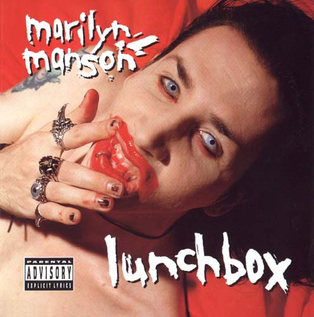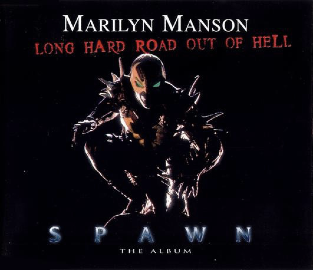
Marilyn Manson is an American rock band formed by namesake lead singer Marilyn Manson and guitarist Daisy Berkowitz in Fort Lauderdale, Florida, in 1989. Originally named Marilyn Manson & the Spooky Kids, they gained a local cult following in South Florida in the early 1990s with their theatrical live performances. In 1993, they were the first act signed to Trent Reznor's Nothing Records label. Until 1996, the name of each member was created by combining the first name of a female sex symbol and the last name of a male serial killer—for example, Marilyn Monroe and Charles Manson. Their lineup has changed between many of their album releases; the eponymous lead singer is the only remaining original member.

Michael Trent Reznor is an American musician. He came to prominence as the founder, lead vocalist, multi-instrumentalist, and primary songwriter of the industrial rock band Nine Inch Nails. The band's line-up has constantly changed, with Reznor being its only official member from its creation in 1988 until 2016, when he added English musician and frequent collaborator Atticus Ross as its second permanent member.
Nothing Records was an American record label specializing in industrial rock and electronic music, founded by John Malm Jr. and Trent Reznor in 1992. It is considered an example of a vanity label, where an artist is able to run a label with some small degree of independence within a larger parent company, in this case the larger company being Interscope Records.

Lost Highway is a 1997 neo-noir film directed by David Lynch, who co-wrote the screenplay with Barry Gifford. It stars Bill Pullman, Patricia Arquette, and Balthazar Getty. The film also features Robert Blake, Jack Nance, and Richard Pryor in their final film performances. The narrative follows a musician (Pullman) who begins receiving unmarked videotapes of himself and his wife (Arquette) at their home before he is suddenly convicted of murder. While imprisoned, he mysteriously disappears and is replaced by a young mechanic (Getty) leading a different life.

Portrait of an American Family is the debut studio album by American rock band Marilyn Manson. It was released on July 19, 1994, by Nothing and Interscope Records. The group was formed in 1989 by vocalist Marilyn Manson and guitarist Daisy Berkowitz, whose names were created by combining the given name of a pop culture icon with the surname of a serial killer: a naming convention which all other band members would conform to for the next seven years. The most prominent lineup of musicians during their formative years included keyboardist Madonna Wayne Gacy, bassist Gidget Gein and drummer Sara Lee Lucas.

Antichrist Superstar is the second studio album by American rock band Marilyn Manson. It was released on October 8, 1996, by Nothing and Interscope Records. It was recorded at Nothing Studios in New Orleans and produced by the band's eponymous vocalist along with Sean Beavan, former Skinny Puppy producer Dave Ogilvie and Trent Reznor of Nine Inch Nails. The recording of the album was marred by excessive drug use, which provoked a high level of antagonism between band members. Consequently, it was their last release to feature contributions from founding guitarist Daisy Berkowitz, who was acrimoniously fired partway through recording.

Smells Like Children is the first EP by American rock band Marilyn Manson. It was released on October 24, 1995, by Nothing and Interscope Records. Produced by Trent Reznor of Nine Inch Nails, it represents an era of the band full of drugs, abuses, tours, sound experiments, and references to the Child Catcher, a villain from the 1968 musical film Chitty Chitty Bang Bang.
Sean Beavan is a musician, record producer, and audio engineer best known for his work with Nine Inch Nails, Marilyn Manson, Guns N' Roses, God Lives Underwater, and Slayer. His production style is typically heavy, with heavily saturated guitars, but his work is diverse and wide-ranging as exemplified by bands like No Doubt to System of a Down, to indie bands like Thrice, Envy on the Coast, Hypernova (band), 8mm, and even death metal band Morbid Angel.
Joseph Cultice is an American photographer.

"The Dope Show" is a song by American rock band Marilyn Manson. It was released in September 1998 as the lead single from their third studio album Mechanical Animals. The lyrics were written by Marilyn Manson and the music composed by Twiggy Ramirez.

"Lunchbox" is a song by American rock band Marilyn Manson. It was released as the second single from their debut album, Portrait of an American Family (1994). A heavy metal song that features elements of death metal, industrial music and punk rock, "Lunchbox" was written by the band's eponymous vocalist, Daisy Berkowitz, and Gidget Gein, and produced by Manson with Trent Reznor. According to Berkowitz, the track was written as the frontman's plea to be left alone; it was also inspired by a time where Manson defended himself from bullies with a Kiss lunchbox. The track features elements of "Fire" (1968) performed by Arthur Brown, a musician who influenced the band.

Lost Highway is the soundtrack album for the 1997 David Lynch film of the same name. It was produced by Trent Reznor of Nine Inch Nails, and includes original music from the film recorded by Reznor, Angelo Badalamenti and Barry Adamson, as well as songs by other artists used in the film. The album reached No. 7 on the Billboard 200 and reached Gold status in the United States and Platinum in Canada. The album was re-released on vinyl in November 2016 by Dutch label Music On Vinyl.
"Eye" is a song by American alternative rock band The Smashing Pumpkins, released in 1997 on the soundtrack to the David Lynch film Lost Highway. Along with the song "The End Is the Beginning Is the End" from Batman & Robin and "Christmastime" from A Very Special Christmas 3, "Eye" represented a period of work on compilations done by the Pumpkins in between the release of the two albums Mellon Collie and the Infinite Sadness and Adore. It also appeared on their greatest hits collection Rotten Apples.

"Get Your Gunn" is a song by American rock band Marilyn Manson. It was released on June 9, 1994 as the band's debut single and is from their debut studio album, Portrait of an American Family (1994). The song was written by the band's eponymous vocalist along with original guitarist and bassist Daisy Berkowitz and Gidget Gein, respectively, and was produced by Manson with Trent Reznor. "Get Your Gunn" was inspired by the murder of abortion provider David Gunn by an anti-abortion activist, an event which angered Manson. The song also took influence from Manson's lifelong fascination with abortion and an interaction he had with an anti-abortion protester.

"The Fight Song" is a song by American rock band Marilyn Manson. It was released in 2001 as the second single from their fourth full-length studio album, Holy Wood .

"Rock Is Dead" is a song by American rock band Marilyn Manson. It was released as the third single from their third studio album, Mechanical Animals (1998). It was written by the band's eponymous frontman, along with bassist Twiggy Ramirez and keyboardist Madonna Wayne Gacy, and was produced by Manson, Michael Beinhorn and Sean Beavan. A glam rock and heavy metal track with elements of electronic music and grunge, the song features electric and bass guitars, keyboards, and live drums in its instrumentation. The song was featured on the soundtrack of the Wachowskis' film The Matrix (1999).

"Dope Hat" is a song by American rock band Marilyn Manson. It was released as the promotional single from their debut album, Portrait of an American Family. It was first recorded for a demo tape released in 1992, entitled The Family Jams.

"Long Hard Road Out of Hell" is a song by American rock band Marilyn Manson and British trip hop band Sneaker Pimps. It was released as a single from the soundtrack to the 1997 motion picture Spawn. An arena rock and gothic rock song, "Long Hard Road Out of Hell" was written by Marilyn Manson and Twiggy Ramirez and produced by Manson and Sean Beavan. Its lyrics are about self-loathing and its title is derived from John Milton's Paradise Lost (1667). After the track was written, the Sneaker Pimps' Kelli Ali was recruited to perform background vocals on it, as the Spawn soundtrack featured collaborations between hard rock artists and electronic music artists. The Sneaker Pimps were dissatisfied with the final track and wanted a remix of it to be released as a single instead; conversely, Manson deemed it a personal favorite.

The High End of Low is the seventh studio album by American rock band Marilyn Manson. It was released on May 20, 2009, by Interscope Records. Multiple editions of the record were released by the label, each containing unique bonus tracks. The album's lyrics were largely inspired by the personal troubles experienced by the band's eponymous vocalist relating to his divorce from burlesque performer Dita Von Teese, as well as his later relationship with actress Evan Rachel Wood.
"Gave Up" is a song by American industrial rock band Nine Inch Nails. Written by frontman Trent Reznor and co-produced by Flood, the song serves as the sixth track of Nine Inch Nails' 1992 EP, Broken. The song is noted for its multiple music videos and became a concert favorite during the band's live performances. The video, which features Marilyn Manson, was filmed at the house where Sharon Tate was murdered by members of the Manson family.

















